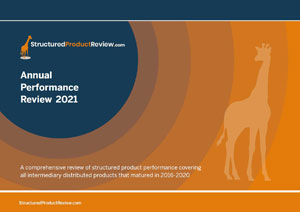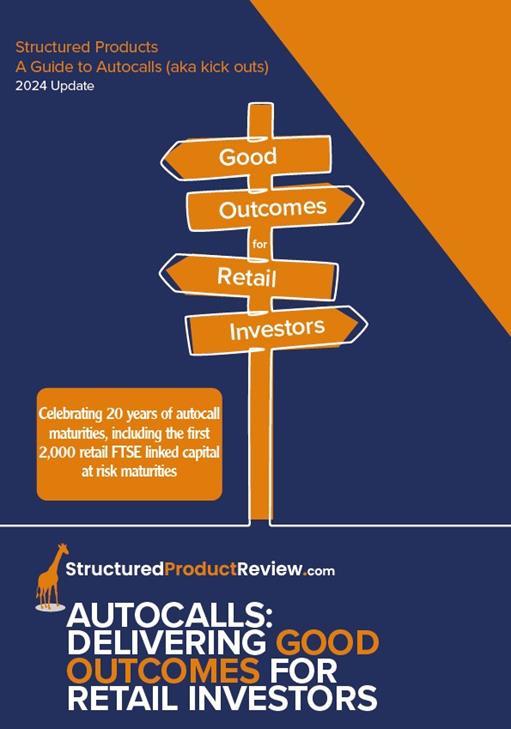08/05/2024
The following article was written by Paul Stadden, UK Sales Manager, iDAD.
I have been involved in Structured Products for well over 15 years and know them to always have had a great story wherever the markets were and wider Investment landscape, as indeed the current cycle.
In the past a peak in the market cycle may have provided a perception that Structured Product terms reduce and therefore their advantages, however their protections on the downside, compared to increased downside market risk perceptions for both Passive & Active Management, would indicate an increased advantage.
In my own honest opinion, I have analysed the different positions for Structured Products in context with Passive/Active management:
Firstly, it is worth pointing out that this is not an overheated peaky market after a long bull run, indeed the FTSE 100 has been range bound for about 5/6 years or so within 7000 – 8000*, apart from the sharp Covid blip. Also, arguably the FTSE 100 has had very little growth since it was at 6930 on the 31st December 1999*, as it stands at approx.7930 in April 2024*, therefore has been heavily reliant on Dividends. Arguably, range bound markets are great for Structured Products and not good for Passive/Active and they don’t want to rely on Dividends at approx. 4%, when both Inflation & 10 Year Gilt Yields are at approx. 4% as well.
The present Structured Product position is as follows:
Structured Deposits will continue to offer a story if as expected we are in a higher interest environment for longer, albeit tapering back a bit. Especially, as they also offer a genuine Cash plus strategy and an alternative for the troubled Fixed Interest asset class. Any downside market risk is alleviated with Full Capital Protection at maturity and FSCS cover against Bank default. Generically Structured Deposit Providers are offering 5.5% - 6.35% pa Income and 6.5% to 8% pa Growth.
Structured Products (Soft Protection), whilst the terms have been held back in the last 2 years due to steady market growth and low volatility, you can still gain some healthy coupons. Generally, FTSE 100 Flat Kick Outs are around 8.5% to 9.5% pa ok for range bound markets and the defensive ones around 6.5% pa to 8.5% pa to provide more reassurance against market fall backs. You can see double digit returns when using dual indices.
To cover a few opinions on where the markets may go from here in the next 5 years or so:
Bullish viewpoint – Structured Products, (Soft Protection), are still offering 10% to 12% pa type trades that don’t require the markets to rise or at least only marginally and this will still look attractive against Passive and some Active players.
Marginal Growth expectations/Range Bound – All the Flat (Soft) Kick Outs will be well placed to deliver healthier returns than all Passive types and arguably most Active. Indeed, even some Deposit trades will look attractive in comparison to Passive.
Wary of a reasonable correction/downside market risk – Structured Deposit trades and the defensive Soft Protection plans will be well placed to ride out this type of cycle, whereas both Passive and Active will struggle.
Significant Bear Market – Structured Deposits will be a saving grace if this plays out, as indeed some of the deepest defensive Soft Protection plans, however, this will be a massive headache for all Passive/Active providers!
It is worth highlighting that some Structured Products will have a different underlying, for instance Commodity type trades. This will suit IFAs/Clients looking for a diversifier away from the traditional equity market driven options, which dominate the choices.
Source - *Yahoo Finance
Structured investments put capital at risk.
Also in this section
- How old is too old? Are structured products to die for?
- Product focus - October 2024
- Q3 2024 Issuance
- Q3 2024 maturity results
- A share of spread bets on steroids?
- Product focus - September 2024
- Maturities of the month - August 2024
- Right on time
- Product focus - August 2024
- Keep calm and zoom out
- 2,000 and counting
- Q2 2024 maturity results
- 20 years of autocall maturities
- Product focus - June 2024
- Fixed income or interest?
- Maturities of the month - May 2024
- The barrier debate - revisited
- Product focus - April 2024
- Maturities of the month - April 2024
- Time to call
- I don't believe markets are ever too high for Structured products!
- Notes on counterparty exposure
- Return of Nikkei
- Q1 2024 issuance
- Q1 2024 maturity results
- Structured Products – AAAAAGH!
- Hop in CIBC
- Re-enter Santander
- How to build a financial fortune - revisited
- Issuance in 2023
- Where's the risk?
- Questionable offerings
- Challenging the case against structured products - 'Loss of dividends'
- Navigating the investment landscape
- Challenging the case against structured products - Counterparty risk
- 6-year autocalls approaching final destination
- 1,750 FTSE capital at risk autocall maturities
- The leopard that changed her spots
- Q3 2023
- Challenging the case against structured products - Keydata
- Dilemmas for UK IFA's and the unique role of Structured Products
- 'High charges'
- Precipice bonds
- Intro
- FTSE 100 Contingent Income
- Indexing the indices
- Something different
- Investing through volatility
- 100 10:10s
- The best or worst?
- The 10%/25% 'Rule' that never was
- Structured products and the yield curve
- Fixed income: Capital at risk?
- Prospects for UK inflation - and fun with A.I!
- The Barrier Debate
- More Deposits for now
- Last of the Americans
- What if?
- Time heals all wounds, we hope...
- How to diversify portfolios using structured products?
- The Proof Is In The Pudding...
- Debunking Structured Misconceptions
- 1,500 FTSE Capital-at-Risk Autocall Maturities
- Q3 2022 Maturity Results
- What do we prefer?
- Deposits vs Capital ‘Protected’
- There’s time yet…
- Where did you invest your clients?
- A Six-Month Reflection
- Return of the Rev Con
- Happy 2nd Birthday FTSE CSDI
- Q2 2022 Maturity Results
- The best and worst yet still the best
- Critique my Suitability - Mariana 10:10 Plan June 2022 (Option 2)
- 10/10 for 55 10:10’s
- Q1 2022 Maturity Results
- 'How to build a financial fortune': a follow up
- Critique my Suitability - Mariana 10:10 Plan April 2022 (Option 2)
- 2021 Capital-at-Risk Autocall Maturity Review
- An unwelcome return...
- CSDI's First Birthday
- Bon Anniversaire
- Introducing the FTSE Custom 100 Synthetic 3.5% Fixed Dividend Index
- Q3 2021 Maturity Results
- Critique my Suitability - Mariana 10:10 Plan October 2021 (Option 2)
- Blurring the lines...
- Beware of false knowledge; it is more dangerous than ignorance
- Good news, bad news...
- Certainty is Certainly a Benefit
- Critique my Suitability - Mariana 10:10 Plan September 2021 (Option 2)
- A Twenty-Year Progression
- Q2 2021 Maturity Results
- Nine 8:8s Post Positive Returns in Falling Markets
- Critique my Suitability
- Q1 2021 Maturity Results
- Morgan Stanley’s Marvelous Maturity Medley
Current Products
We review the UK's retail structured investment sector, providing pertinent support for Professional Advisers and relevant research tools.
View all ⟶


